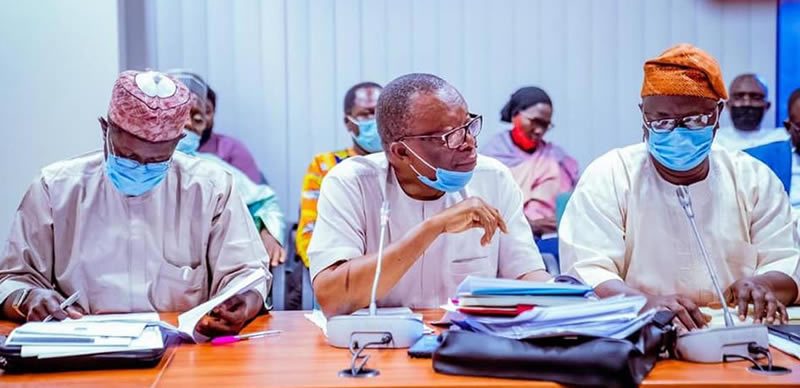Following the payment of half salaries to members by the federal government, the Academic Staff Union of Universities, ASUU, concluded its National Executive Committee, NEC, meeting late on Monday (yesterday) with a determination to not engage in another strike.
Rather, the union, according to Newsmen, resolved to wait for the outcome of the intervention of the speaker of the House of Representatives, Femi Gbajabiamila in its faceoff with the government over alleged non-implementation of the 2009 agreement by the latter.
“Although no member of the body, including the president, Prof. Emmanuel Osodeke, who attended the meeting held at the University of Abuja campus, where ASUU’s headquarters is located, has spoken about the outcome, a source said members resolved not to explore the strike option in getting the government to address the contending issues.
“It was gathered that some members had pushed for a declaration of total and comprehensive strike across public universities across the country but the majority kicked against the action, saying it was no longer fashionable under the present circumstance.
“Those against the strike argued that it would be wrong to embark on the action again, thus compelling students who had already returned to their various schools, following earlier suspension of the action, to return home.
Read Also: 2023: Sowore promises Nigerians free education if elected president
“The statement released by the Speaker of the House of Representatives, Femi Gbajabiamila, to the effect that government would not pay members full salaries, was said to have further deflated the argument by those who had pushed for strike as a last option.
“Some members had suggested that since the suspension of the strike was at the speaker’s instance, following his meeting with President Muhammadu Buhari, it would be wrong to resume action when he (speaker) was still pushing to have the federal government rescind its decisions on no-work,no-pay policy.
A source at the meeting said: “Embarking on another round of strike was not considered an option in resolving the current issues with the federal government at the meeting.”
Asked what really transpired at the meeting, he said: “You would hear the rest through the appropriate channel.
“As a body, we have people that speak for us. You will hear from them on what really happened.”
However, in a statement released following the meeting, ASUU President Prof. Emmanuel Osodeke criticized the Federal Government for paying professors only half of their October wages.
He criticized the ‘pro-rata’ payment to union members and accused the government of attempting to reduce Nigerian intellectuals to part-time employees.
The union’s move was a demonstration of unwavering faith in the ability of the court and other government institutions and bodies to place the national interest above all other concerns.
Osodeke stated, “‘This we believe, as a union of thinkers, intellectuals, and patriots, will not only aid the process of amicable resolution of the crisis but also set the tone for smooth industrial relations between government and Nigerian workers at large,”
He stated, however, that the government’s response, particularly its “pro-rata” payment of academics’ October salary, presented them as hourly employees.
Osodeke continued, This is not only an aberration but also a contravention of all-known rules of engagement in any contract of employment for academics the world over.”
According to him, the ASUU National Executive Committee, NEC, met on Monday to discuss the development and noted with dismay that paying academics on a pro-rata basis, like casual workers, is unprecedented in the history of university-oriented labour relations and, as a result, condemned this attempt to reduce all Nigerian scholars to casual workers.
FG defends the payment of half salary
The Federal Government defended the October pro-rata payment to ASUU members over the weekend, arguing that they could not be compensated for work that had not been completed.
The Minister of Labour and Employment, Chris Ngige, through his ministry’s spokesman, Olajide Oshundun, also refuted media accusations that the government was discriminatory in its compensation of university professors.
They were compensated proportionally to the number of days worked throughout the month of October. You cannot compensate someone for work that has not been completed. He stated that everyone’s hands were tied.
No work, no pay is legal
In addition, the speaker of the House of Representatives, Femi Gbajabiamila, announced on Monday that the green chamber was making plans for a N170 billion fund for ASUU in the 2023 budget.
“We are currently working on the 2023 Appropriations Bill, which includes N170billion to provide a level of increment in the welfare package of university lecturers.
“The Bill also includes an additional N300 billion in revitalization funds to improve the infrastructure and operations of federal universities.
‘The ‘no work no pay’ policy embarked on by the Federal Government during the period of strike is premised on the law,” Gbajabiamila had said.
The decision was based on the government’s legitimate interest in minimizing moral hazard and discouraging disruptive industrial operations, according to him.
He said the decision was based on the government’s legitimate interest in preventing moral hazard and discouraging disruptive industrial actions.
“Nonetheless, interventions have been made to explore the possibility of partial payments to the lecturers. We look forward to a favorable consideration by His Excellency, President Muhammadu Buhari, who has manifested his desire to what is prudent and necessary to resolve all outstanding issues.
“Implementing meaningful change takes time, especially when appropriations and modifications to systems such as IPPIS are required.
“Therefore, I urge all parties to be patient and grant each other the presumption of goodwill to the extent necessary to achieve our shared objectives. This is not a time for political brinkmanship,” he said.















